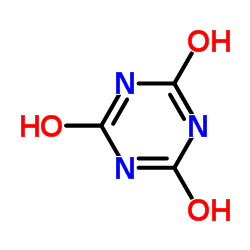Tricyanic acid

Tricyanic acid structure
|
Common Name | Tricyanic acid | ||
|---|---|---|---|---|
| CAS Number | 108-80-5 | Molecular Weight | 129.074 | |
| Density | 2.0±0.1 g/cm3 | Boiling Point | 793.4±43.0 °C at 760 mmHg | |
| Molecular Formula | C3H3N3O3 | Melting Point | 360 °C | |
| MSDS | USA | Flash Point | 433.6±28.2 °C | |
|
Validation of a rapid method of analysis using ultrahigh-performance liquid chromatography - tandem mass spectrometry for nitrogen-rich adulterants in nutritional food ingredients.
J. Chromatogr. A. 1373 , 106-13, (2014) A method for the rapid quantification of 9 potential nitrogen-rich economic adulterants (dicyandiamide, urea, biuret, cyromazine, amidinourea, ammeline, amidinourea, melamine, and cyanuric acid) in five milk and soy derived nutritional ingredients, i.e. whole... |
|
|
Defining sequence space and reaction products within the cyanuric acid hydrolase (AtzD)/barbiturase protein family.
J. Bacteriol. 194(17) , 4579-88, (2012) Cyanuric acid hydrolases (AtzD) and barbiturases are homologous, found almost exclusively in bacteria, and comprise a rare protein family with no discernible linkage to other protein families or an X-ray structural class. There has been confusion in the liter... |
|
|
Comparing atrazine and cyanuric acid electro-oxidation on mixed oxide and boron-doped diamond electrodes.
Environ. Technol. 34(5-8) , 1043-51, (2013) The breakdown of pesticides has been promoted by many methods for clean up of contaminated soil and wastewaters. The main goal is to decrease the toxicity of the parent compound to achieve non-toxic compounds or even, when complete mineralization occurs, carb... |
|
|
Efficient self-assembly in water of long noncovalent polymers by nucleobase analogues.
J. Am. Chem. Soc. 135(7) , 2447-50, (2013) Molecular self-assembly is widely appreciated to result from a delicate balance between several noncovalent interactions and solvation effects. However, current design approaches for achieving self-assembly in water with small, synthetic molecules do not cons... |
|
|
Antioxidant responses and renal crystal formation in rainbow trout treated with melamine administered individually or in combination with cyanuric acid.
J. Toxicol. Environ. Health A 76(8) , 491-508, (2013) In 2007 and 2008, renal stone formation and kidney damage in human infants were linked to consumption of melamine (MEL)-contaminated infant formula, as well as renal failure and death in pets due to pet food containing both MEL and cyanuric acid (CYA). The ai... |
|
|
Recent advances in the risk assessment of melamine and cyanuric acid in animal feed
Toxicol. Appl. Pharmacol. 270(3) , 218-29, (2013) Melamine can be present at low levels in food and feed mostly from its legal use as a food contact material in laminates and plastics, as a trace contaminant in nitrogen supplements used in animal feeds, and as a metabolite of the pesticide cyromazine. The me... |
|
|
Melamine-induced renal toxicity is mediated by the gut microbiota.
Sci. Transl. Med. 5(172) , 172ra22, (2013) Melamine poisoning has become widely publicized after a recent occurrence of renal injury in infants and children exposed to melamine-tainted milk in China. This renal damage is believed to result from kidney stones formed from melamine and uric acid or from ... |
|
|
Could infrared spectroscopy identify melamine-related stone using melamine-contained mixture as a reference?
J. Clin. Lab Anal. 27(1) , 59-61, (2013) Recently, a method of infrared spectroscopy analysis to identify melamine-contained stone was established by examining melamine powders mixed with true urinary stones. However, several studies demonstrated melamine could be interacted with cyanuric acid or ur... |
|
|
Effect on morphology, oxidative stress and energy metabolism enzymes in the testes of mice after a 13-week oral administration of melamine and cyanuric acid combination.
Regul Toxicol Pharmacol 65(2) , 183-8, (2013) Cases of pet poisoning and infant renal calculus have attracted much attention to the toxicity of melamine and its derivatives, such as cyanuric acid. Although individually melamine and cyanuric acid have low toxicity, their simultaneous presence can cause se... |
|
|
Small-molecule/polymer recognition triggers aqueous-phase assembly and encapsulation.
Langmuir 29(1) , 144-50, (2013) An aqueous-soluble melamine polymer was condensed into nanoparticles by specific heterocycle binding interactions with 5-fluorouracil (5-FU) or cyanuric acid (CA). Small-molecule/polymer recognition of this type exhibits a clear exothermic binding signature a... |